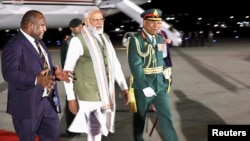Indian Prime Minister Narendra Modi is joining Pacific leaders at a summit in Papua New Guinea Monday as New Delhi seeks to counter China's influence in the region.
Papua New Guinea is hosting the third Forum for India-Pacific Islands Cooperation as the United States is seeking to increase Washington’s presence in the Indo-Pacific. It brings together leaders from India, 14 Pacific Island nations as well as Australia and New Zealand.
Energy supplies, climate change and regional security are expected to be on the agenda.
Analysts have said the summit is a sign that strategic competition in the region is not just about China and the United States. India wants to foster new trade and political ties, and to give island leaders an alternative to the major powers in Beijing and Washington.
Paul Barker, executive director of the Institute of National Affairs, an independent think-tank in Papua New Guinea, told the Australian Broadcasting Corp’s AM program that Modi’s visit was designed to enhance his country’s diplomatic influence in the Pacific.
“India as an alternative international power source, economic source but also a leader in the movement on non-aligned nations over many, many years,” Barker said, “It wants to, sort of, be able to affiliate with many of the voices across the Pacific.”
Barker also said the United States was increasing its strategic interest in the region in response to China’s regional ambitions. Last year, Beijing signed a defense agreement with Solomon Islands, a near-neighbor to Papua New Guinea.
U.S. President Joe Biden canceled a visit to Port Moresby because of debt ceiling negotiations back home.
U.S. Secretary of State Antony Blinken will attend in his absence and is expected to sign a defense cooperation agreement with the government in Port Moresby.
The accord could allow for a significant U.S. military presence in Papua New Guinea. A second bilateral pact is expected to allow the U.S. to help the Pacific nation combat illegal fishing and transnational crime.
University students in Papua New Guinea have demonstrated against the signing of the defense accord with Washington, calling for more transparency from Papua New Guinea Prime Minister James Marape.
He told reporters Monday that his country had nothing to fear from the agreement, adding that “as we go forward over the next 15 years, we will see U.S. soldiers in our country.”






